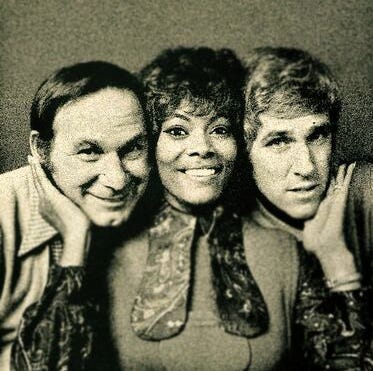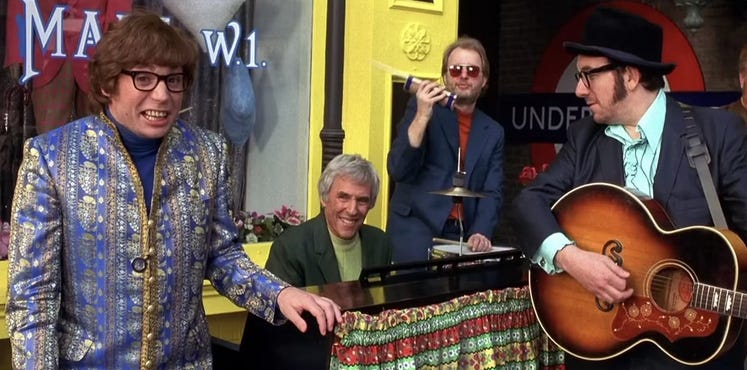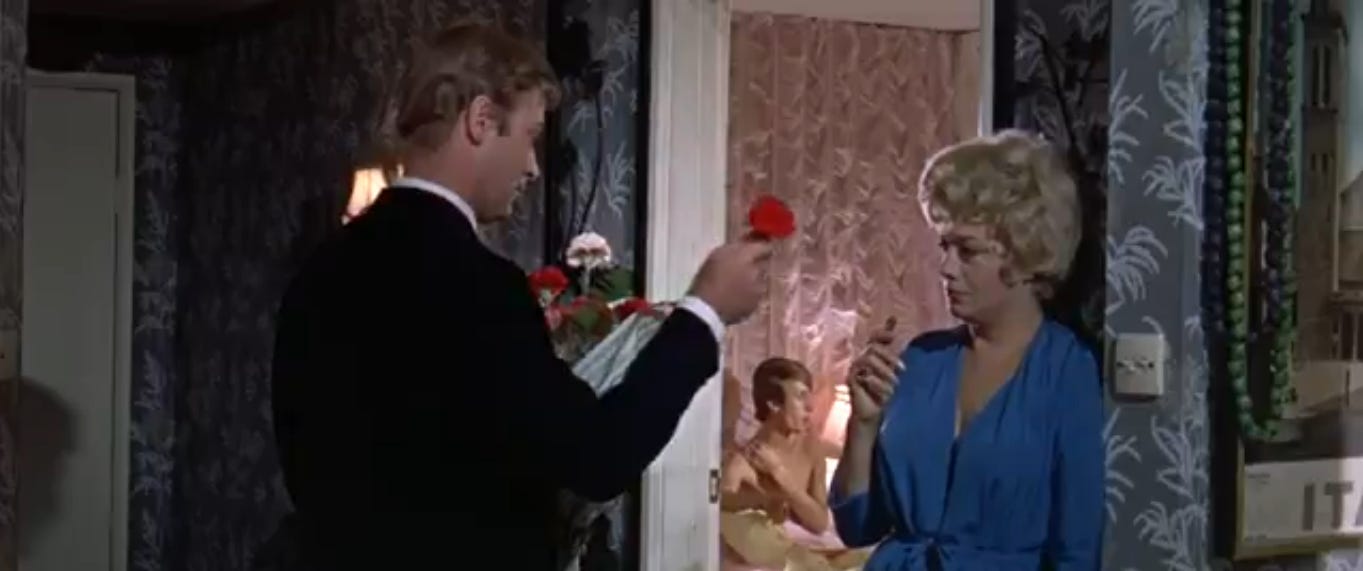If you’re like me, you might not know that Michael Caine was once young. I mean, sure, you probably don’t think he has progeria or is doing a Benjamin Button or whatever. But you might not be aware of the films he made before becoming Christopher Nolan’s exposition machine. Hence, this is an opportunity for learning, and we’ll start learning about Young Michael Caine with the film Alfie.
In Alfie, Caine is a fourth wall breaking womanizer, a pick-up artist with tips for days. None of those tips are “condoms,” though, and by the film’s fifteen minute mark he’s gotten Gilda (Julia Foster) pregnant. She has the baby but Alfie escapes the relationship when Gilda marries another man.
Alfie then starts juggling three new girls. He shacks up with the quiet Annie (Jane Asher), but she bails upon realizing he’s a jerk. He lays Lily (Vivien Merchant), the wife of his friend, but when she gets pregnant, he gets her an abortion. And he casually sees older lustbox Ruby (Shelley Winters), but it turns out she’s two-timing him.
Alfie learns nothing from the events of the film, though the title song that plays over the credits picks up the slack and explains what the movie was about:
Without true love we just exist, Alfie
Until you find the love you’ve missed
You’re nothing, Alfie
Rating: 5/10, a character journey that doesn’t reach its destination.
Cast and Crew
Young Michael Caine’s1 breakout film performance was Zulu (1964)2, where he was cast as an officer in the British army and donned an uncomfortable aristocratic accent. He began using his normal Cockney voice when he got the role of crook-turned-spy Harry Palmer in The Ipcress File (1965). Stay tuned: we’ll see lots more of Michael Caine.
The notches on Alfie’s bedpost were played by:
Shelley Winters. We last saw her getting murdered in A Place in the Sun, but over time Winters evolved from a killable ingénue into something far more interesting. Her varied film credits, which include The Diary of Anne Frank (1959), Lolita (1962), A Patch of Blue (1965), and The Poseidon Adventure (1972), reflect that transformation. So does her Oscar hardware (two wins for Best Supporting Actress).
Vivien Merchant played Lily, who has the abortion. She was a stage actress known for starring in Harold Pinter’s plays—and for being married to him. She was nominated for a Tony for starring in his play “The Homecoming.”
Jane Asher is another actress well-known for a famous relationship: she was Paul McCartney’s one-time fiancée. McCartney wrote “We Can Work It Out” about Asher, though it appears they were not, in fact, able to work it out.
The Trivia
Remember the title song of Alfie, which we quoted above? The one that’ll give you the moral of the film and save you two hours? That succinct songwriting came from the duo of Burt Bacharach (music) and Hal David (lyrics). These guys’ names are on dozens of Top 40 hits, and we’ll be discussing some of those songs below. As usual, here’s a Spotify playlist that contains all the tracks mentioned in the column if you’d like to follow along.
Bacharach met David at the Brill Building, a pop music industry hub of the ‘50s and ‘60s where songwriters and producers cranked out songs with assembly line efficiency.3 Our boys had their first major hit in 1958 with Perry Como’s “Magic Moments.” I think “Magic Moments” is moldy af, but the NYTimes obit for Bacharach more charitably described it and songs like it as “effervescent compositions [that] epitomized sophisticated hedonism.” Sure, whatever.
It was in 1962 that David and Bacharach started their collaboration with Dionne Warwick, the person who’d become known as “the pair’s definitive interpreter.”4 That first song was “Don’t Make Me Over,”5 and you know what? That song is good. Maybe even “sophisticated hedonism” good.

Their partnership generated many, many hits, including (but not limited to) the songs below:
“Walk On By”6 (1964)
“Wishin’ and Hopin’” (1964, but a bigger hit for Dusty Springfield, the woman considered first runner-up for finest interpreter of Bacharach/David7)
“I Say A Little Prayer” (1967)
“Do You Know the Way to San Jose?” (1968)
“Promises, Promises” and “I’ll Never Fall In Love Again” (both 1968).
Those last two were written for the musical “Promises, Promises,” which was based on the film The Apartment. Bacharach and David teamed up with Neil Simon (who did the book) and the production scored seven Tony nominations.
But it wasn’t just Dionne Warwick who had success with the duo’s songs. Sometimes it seemed like the songs of Bacharach and David would chart no matter who was singing them. Here’s a smattering of their other hits:
“What the World Needs Now Is Love” (1965), performed by Jackie DeShannon
“What’s New Pussycat?” (1965), written for the same-named film and performed by Tom Jones
“One Less Bell to Answer” (1967), the grammatically correct track the 5th Dimension took to #2
“Raindrops Keep Fallin’ On My Head” (1969), a B. J. Thomas song written for Butch Cassidy and the Sundance Kid. The song went to #1,8 Burt and Hal won an Oscar for it, and Burt won another Oscar for scoring the film.
Some of the songs they wrote in the ‘60s became hits when covered by other artists. Their 1963 song “They Long to Be Close to You” was written for Richard Chamberlain9, but when it was covered by the Carpenters, it went to #1. In the ‘80s, Luther Vandross scored with “A House Is Not A Home” and Naked Eyes gave “Always Something There to Remind Me” a second life. Even stupid-ass “Magic Moments” came back in the ‘90s when British electropop band Erasure10 covered it.
Bacharach and David had an acrimonious split in the ‘70s after working on Lost Horizon (1973), a notorious musical bomb. Bacharach found a new songwriting partner (and wife) in Carole Bayer Sager11; together, they wrote “That’s What Friends Are For,” a #1 for Dionne Warwick and Friends.12 Hal David also had solo hits, including “To All the Girls I’ve Loved Before,” a song performed by Julio Iglesias and Willie Nelson.

Yes, this was a lot of sleepy music from a long time ago, but the alternative Trivia theme I was kicking around was “the history of abortion,” so, y’know, it coulda been worse.
Odds and Ends
Alfie reads the poem “Abou Ben Adhem” to his kid…saxophonist Sonny Rollins did the soundtrack for the film…Alfie plays draughts with a friend; “draughts” is just what they call checkers in England.
Also, for completeness: Alfie had a sequel, 1975’s Alfie Darling, which replaced Young Michael Caine with Alan Price. Then there was Alfie, a 2004 “re-imagining” of the first two films that had Jude Law in the title role. I’m pretty glad we won’t be watching either of those films.
CORRECTION: In our last post, we stated that the title character of “Rumpole of the Bailey” was a judge. NOPE! He was a barrister. Our thanks to Yogesh for setting us straight.
Real name Maurice Micklewhite. The story he tells is that, while on a pay phone with his agent, he had to quickly come up with a stage name. Across the street was the marquee for The Caine Mutiny, so yep, “Caine” it was. (The punchline to his story is that he was lucky One Hundred and One Dalmatians wasn’t playing that day.)
We described Zulu as “colonialist 300 (2006)” in our 1964 Wrap-Up column.
Looking at Bacharach’s list of songs written shows you the incredible pace at which he cranked out pop hits.
Warwick’s Spotify says she has an “aching yet detached alto voice” for which Bacharach and David “tailored their unusually complicated songs.”
Warwick’s aunt is Cissy Houston. Houston sang backup on “Don’t Make Me Over” but is more famous as the mother of Whitney Houston.
You might recognize “Walk On By” as the main sample on the awful 2023 Doja Cat song “Paint the Town Red.”
Springfield had another hit with one of their songs, “The Look of Love,” which was written for the film Casino Royale (1967). Bacharach/David also wrote the theme song for Casino Royale, which was performed by Herb Alpert and the Tijuana Brass (though I prefer Chris Cornell tbh).
Bacharach and David had a previous #1: “This Guy’s In Love with You” (1968), which Tom Breihan had to write about. You can also read Breihan on two other Bacharach #1s we’re not discussing: “Arthur’s Theme” (1981) and “On My Own” (1986). We will eventually watch Arthur, the film for which “Arthur’s Theme” is the theme.
Richard Chamberlain is better known as an actor. He played the lead character on the TV show “Dr. Kildare” (1961–1966).
One half of Erasure is Vince Clarke, a member of Depeche Mode and Yazoo. He might be cool but even he can’t save “Magic Moments.”
Bacharach had another famous spouse: he was married to actress Angie Dickinson. She’s best known for starring in “Police Woman” (1974–1978), a show that was groundbreaking because it was about a police woman.
Those friends were big draws: Stevie Wonder, Elton John, and Gladys Knight.


